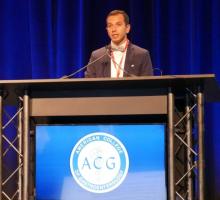PHILADELPHIA – Researchers have identified a link between obesity and an increased incidence rate of gastrointestinal (GI) cancers in younger patients as well as an increased rate of colorectal, esophageal, and pancreatic cancer resections in obese patients of various ages, according to an award-winning presentation at the annual meeting of the American College of Gastroenterology.
“These findings strengthen a contributing role of obesity in etiology as well as increasing incidence of these cancers, and call for more efforts targeting obesity,” Hisham Hussan, MD, assistant professor at The Ohio State University Wexner Medical Center in Columbus, stated in his presentation.
The abstract, presented by Dr. Hussan, received an American College of Gastroenterology Category Award in the subject of obesity. He noted in his presentation that the obesity rate in U.S. adults exceeded 37% in 2014. In addition, the temporal changes of obesity-related GI cancers with regard to age-specific groups are not known, he said.
“There’s sufficient evidence linking obesity to certain [GI cancers], such as esophagus, colon, pancreas, and gastric,” Dr. Hussan said. “However, the impact of rising obesity prevalence on the incidence of these obesity-related GI cancers is unknown.”
Dr. Hussan and his colleagues sought to investigate the incidence of obesity-related GI cancers by age group as well as whether there was an association between obesity-related GI cancers in both obese and nonobese patients.
“Our hypothesis is that the incidence of some obesity-related GI cancers is rising in some age groups, and we suspect that this corresponds with increasing rates of obese patients undergoing these cancerous resections,” he said in his presentation.
The researchers evaluated cancer incidence trends in the Surveillance, Epidemiology and End Results (SEER) database between 2002 and 2013 as well as obesity trends from 91,116 obese patients (7.16%) and 1,181,127 nonobese patients (92.84%) in the National Inpatient Sample (NIS) database who underwent cancer resection surgeries. Of these, 93.1% of patients underwent colorectal and 4.4% of patients underwent gastric cancer resections. Patients were considered obese if they had a body mass index of at least 30 kg/m2. The researchers examined annual trends for incidence rates of obesity-related GI cancers by age group and obesity-related GI cancer resection by age and obesity, using a joinpoint regression analysis to determine the percentage change per year.
In patients aged between 20 and 49 years, the incidence of colorectal cancer increased by 1.5% compared with a decrease of 1.5% in patients aged between 50 and 64 years old, a 3.8% decrease in patients aged 65-74 years, and a 3.9% decrease in patients who were a minimum of 75 years old. Gastric cancer incidence also increased by 0.7% in patients aged between 20 and 49 years compared with a 0.5%, 1.1%, and 1.8% decrease among patients who were aged 50-64 years, 65-74 years, and at least 75 years, respectively. There was an increased cancer incidence among patients in the 20- to 49-year-old age group (0.8%), 50- to 64-year-old age group (1.0%), 65- to 74-year-old age group (0.7%), and the 75-and-older group (1.0%). Esophageal cancer was associated with a decreased incidence in the 20- to 49-year-old group (1.8%), 50- to 64-year-old group (1.1%), 65- to 74-year-old age group (1.2%), and the 75-and-older group (0.7%)
For obese patients who underwent colorectal cancer resection, there was a 13.1% increase in the 18- to 49-year-old group, a 10.3% increase in the 50- to 64-year-old group, an 11.3% increase in the 65- to 74-year-old group, and a 12.8% increase in the 75-year-or-older group, compared with an overall decreased incidence in the nonobese group. There was an increased rate of pancreatic cancer resections for obese patients in the 50-to 64-year-old group (26.9%) and 65- to 74-year-old group (27.6%), compared with nonobese patients. Patients in the 18- to 49-year-old group (11.2%), 50- to 64-year-old group (14.6%), and 65- to 74-year-old group (25.7%) also had a higher incidence of esophageal cancer resections.
The limitations of the study included defining BMI at the time of surgery, which does not account for weight loss due to cachexia, and relying on ICD-9 codes for obesity, which “may not be reliable in some cases.
“However, we [saw] an increase in obese patients who come for resection, so it could have probably been more pronounced if we had accounted for obesity at the earlier age before diagnosis,” he added.
Dr. Hussan reports no relevant conflicts of interest.
SOURCE: Hussan H. ACG 2018, Presentation 34.


